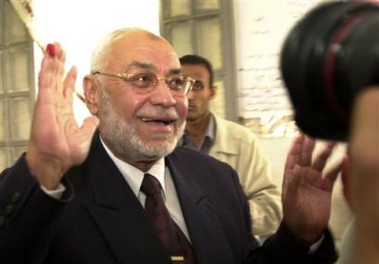|
Egyptians vote in rare contested election
(AP)
Updated: 2005-11-09 23:27
Egyptians cast ballots Wednesday in their most robustly
contested parliamentary election in more than 50 years, but no one expected the
vote to unseat the long-dominant party of President Hosni Mubarak.

Muslim Brotherhood supreme leader, Mohammed
Mahdi Akef, greets journalists after voting at a polling station in
Cairo's suburb of Nasr City during the first stage of Egypt's
parliamentary elections, which started Wednesday Nov. 9, 2005, and finish
Dec. 1. Egyptians went to the polls Wednesday in their most robustly
contested parliamentary election in more than 50 years, but no one
expected the vote to unseat the long dominant party of President Hosni
Mubarak. [AP] |
Democracy campaigners see the elections as a test of the 77-year-old
Mubarak's promise to open up the political system. Popular confidence in the
polls will be demonstrated by the turnout.
The ruling National Democratic Party is pushing for a large turnout after the
disappointment of a September vote, when Mubarak was returned to power. Only 23
percent of 32 million registered voters took part. An independent judicial
review on Tuesday said that election was tainted.
Virtually everyone across the political spectrum expected these elections to
be more open than previous ones, following a court decision that Egyptian
election monitors must be allowed into polling places to guard against the
rampant fraud seen in the past. But critics say the reform process has not moved
nearly far enough to threaten the ruling party's hold on power.
A record 5,000 candidates are vying for 454 seats in parliament. The
elections are spread over three stages, beginning with Wednesday's vote in Cairo
and seven other provinces and followed by votes on Nov. 20 and Dec. 1.
Voting was slow but steady Wednesday. Turnout was heavier than in September
in some districts, such as south Cairo's Maadi, where hundreds were standing in
line to vote within hours of the polls' opening.
Workers for the Muslim Brotherhood — Egypt's largest, but banned, Islamist
group — competed with ruling party activists to bring voters to the polls.
Brotherhood supporters lined the separate male and female entrances at one
polling station. National Democratic Party workers used three minibuses to bring
people to the el-Khalili School station in Maadi where the ruling party offered
sandwiches to voters.
Police had to intervene at the el-Minshiya polling station in southern Cairo
when scuffles broke out among supporters of an NDP candidate and an independent
candidate.
One voter, housewife Wafa Imam, 30, said the elections were fairer than
previous ones.
"In 2000, the police prevented Brotherhood supporters
from entering this street to go to the polling station, but now it is different.
We are being allowed to vote even though the police know that we are Brotherhood supporters,"
she said.
Observers also noted that for the first time, ballot
boxes were transparent.
|